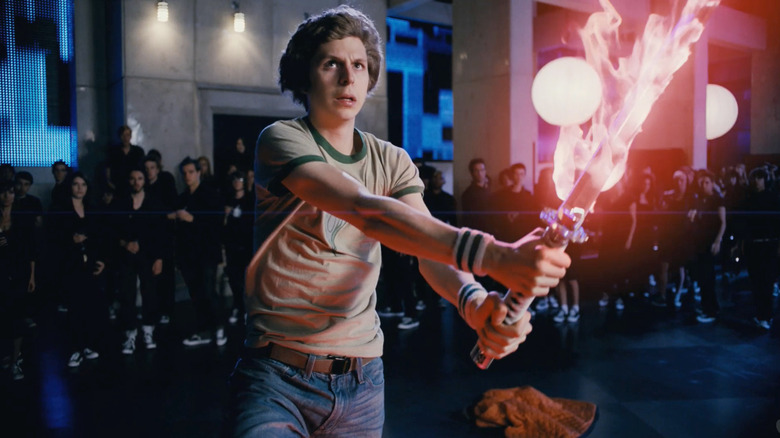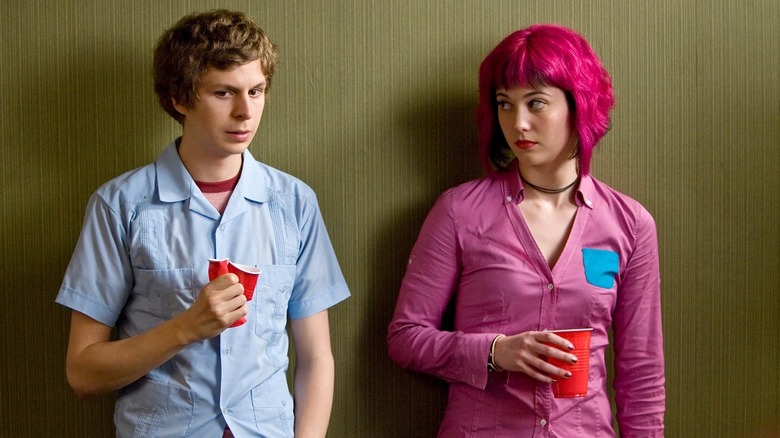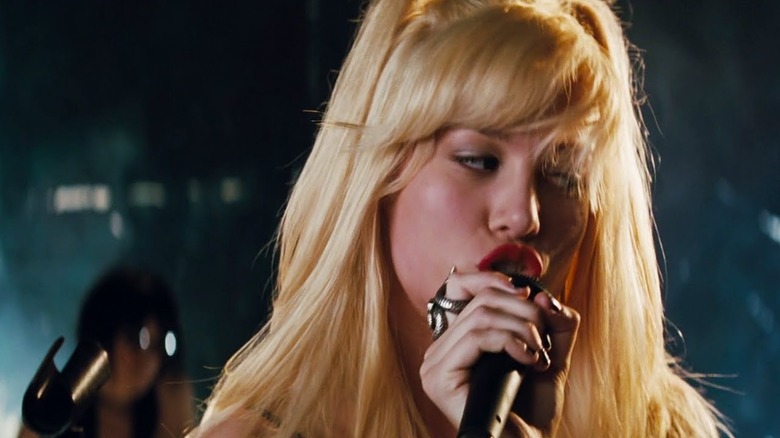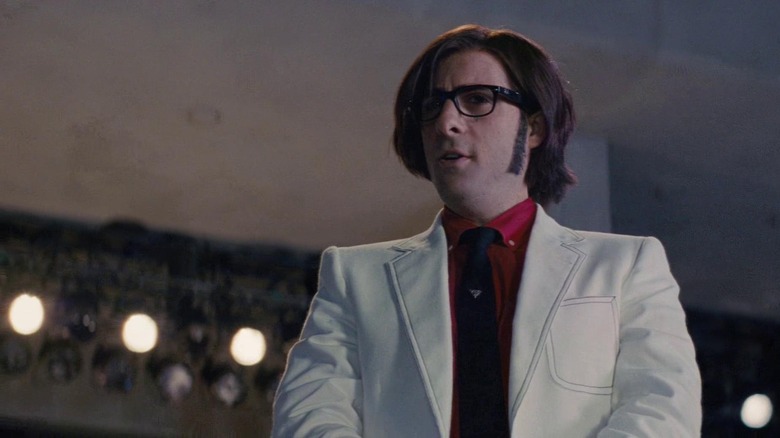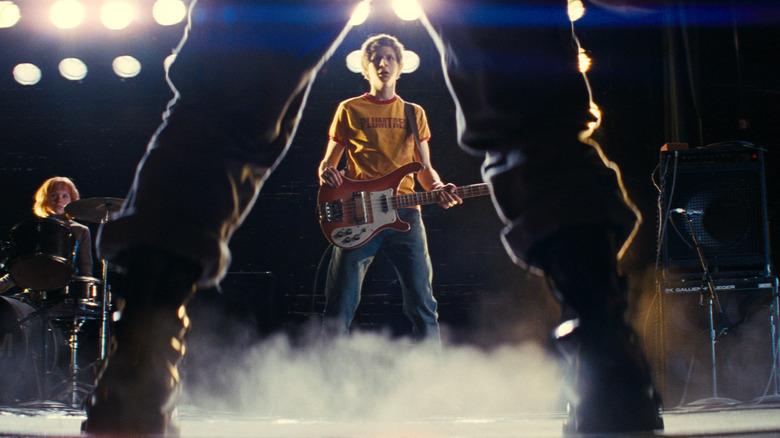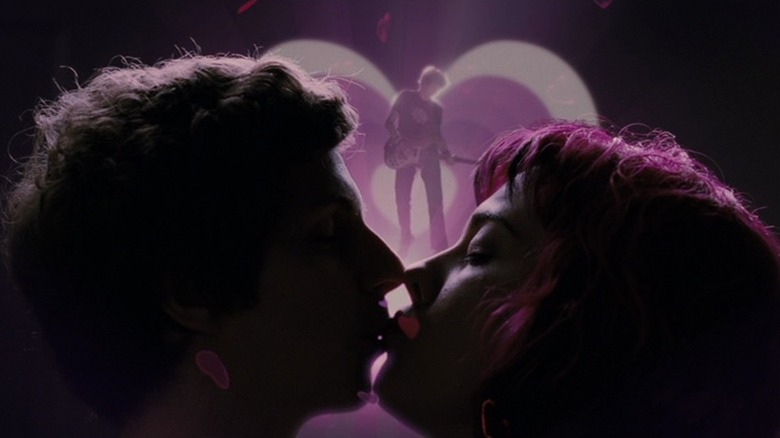15 Years Ago, One Of The Most Unique Comic Book Movies Ever Was A Major Box Office Bummer
(Welcome to Tales from the Box Office, our column that examines box office miracles, disasters, and everything in between, as well as what we can learn from them.)
"Taking the sensibility of Edgar Wright, before I even knew what he wanted to do with it, and applying it to that material, I knew in an instant that this could be quite a combustible combination." Those are the words of producer Marc Platt speaking on a making-of documentary attached to the "Scott Pilgrim vs. the World" Blu-ray release. Naturally, the material he's talking about was the "Scott Pilgrim" comics by Bryan Lee O'Malley.
Wright was coming off of the success of his now-classic horror/comedy "Shaun of the Dead" and its follow-up, the brilliant cop comedy "Hot Fuzz." Both movies were decent hits that put Wright on Hollywood's radar in a big way. When Universal Pictures was looking to put together a big-budget adaptation of O'Malley's quirky comic, they thought of Wright and his unique, distinctive, kinetic filmmaking style.
It was the perfect marriage of director and source material. It came shortly after the Marvel Cinematic Universe launched with "Iron Man" in 2008, when comic books were booming on the big screen. On paper, "Scott Pilgrim" had everything going for it. The only problem? Making people in the real world care enough (at least at first) was harder than Universal thought.
In this week's Tales from the Box Office, we're looking back at "Scott Pilgrim vs. the World" in honor of its 15th anniversary. We'll go over how it came to be, how everything seemed to be going exactly right, what happened when the movie hit theaters, what happened in the aftermath of its release, and what we can learn from it all these years later. Let's dig in, shall we?
The movie: Scott Pilgrim vs. the World
The film centers on Scott Pilgrim (Michael Cera) who just met the literal girl of his dreams, Ramona Flowers (Mary Elizabeth Winstead). However, before they can date, he must defeat her seven evil exes, including a movie star skateboarder, a vegan rock star, and even identical twins.
"I first heard about 'Scott Pilgrim' at a 'Shaun of the Dead' screening in 2004," Wright explained in the movie's making-of doc. "There was a screening in LA and two producers, Jared LeBoff and Adam Siegel, came along to the screening and collared me afterwards and said, 'We have this book. You have to read it. It's perfect for you.'"
Indeed, it seemed absolutely perfect for Wright and the director agreed, signing on to develop the project. The timing seemed ideal; "The Dark Knight" had just made $1 billion and the MCU was firing on all cylinders. Marvel and DC were tied up at Disney and Warner Bros., respectively, which meant other studios had to get more creative if they wanted to get in on the superhero/comic book boom. That's why Universal turned to O'Malley and his out-of-the-box tale.
O'Malley was involved from "day one" of the process, according to the producers. That means he was on board for quite some time as "Scott Pilgrim vs. the World" was in development for years before it actually began filming, with the cast slowly coming together over that time.
Scott Pilgrim comes together perfectly - or so it seems
The movie spent so long in development that Cera, who was originally too young, aged into the role of Scott Pilgrim. It proved to be perfect casting as the shock of seeing Cera (who was coming off of the hit R-rated comedy "Superbad" and a long run on "Arrested Development") fighting the guy who would end up playing Captain America captured the spirit of the source material perfectly. As Wright explained:
"It was just great to see him in situations that go outside his comfort zone. In a way, having another actor who would have been more obviously physical wouldn't have seemed as surprising or funny, to have them involved in fight scenes."
The rest of the ensemble was impressive, with Mary Elizabeth Winstead ("Death Proof") as Ramona, Anna Kendrick ("Twilight") as Stacey, Brie Larson ("21 Jump Street") as Envy Adams, Aubrey Plaza ("Parks and Recreation") as Julie, Chris Evans ("Fantastic Four") as Lucas Lee, Ellen Wong in her feature debut as Knives, Jason Schwartzman ("Rushmore") as Gideon, and future Oscar-winner Kieran Culkin ("Home Alone") as Wallace.
The production went to some of the real locations that O'Malley used as photo references for the comic, such as the Second Cup coffee shop. The attempts to make it authentic were extensive. That authenticity came at a reasonable-by-comic-book-movie-standards cost, with a budget in the $60 million range.
Universal exercised great confidence in Scott Pilgrim
Wright's love for music paired well with "Scott Pilgrim." He put together a killer soundtrack, which was much-hyped. The poster also helped lean into the comic book-y, musical nature of the film calling it an "epic of epic epicness" alongside an image of Cera's Scott playing his bass guitar. Universal seemed remarkably confident in what they had.
They gave "Scott Pilgrim vs. the World" the red carpet treatment, including a huge showing at San Diego Comic-Con in 2010. Around this time, there was a lot of grumbling from comic book fan communities suggesting that SDCC had become too much of a Hollywood show. But — "There's one movie that everyone agrees was made for Comic-Con: 'Scott Pilgrim vs. the World,'" Wired said at the time.
Not only did the film have a star-studded panel, but there was a "Scott Pilgrim Experience" and, most important of all, a full screening of the film for many fans who attended the panel. The band Metric even played a small concert after the screening. Devindra Hardawar, writing for /Film at the time, said "the experience was magical." The SDCC crowd ate it up and the response was, naturally, very positive.
But as big as SDCC is, it's also something of a bubble, catering to hardcore fans. Would Universal be able to effectively sell it to more casual moviegoers? In a pre-release interview with Time Out, Cera expressed mild concern that it might be a tough movie to market to the masses.
"I think 'Scott Pilgrim' is a tricky one to sell. I don't know how you convey that movie in a marketing campaign. I can see it being something that people are slow to discover."
Unfortunately, it turned out that Cera's assessment of the film was dead-on.
The financial journey
After pouring all of its hopes and resources on a fan-first approach with the marketing, Universal released "Scott Pilgrim vs. the World" in theaters on the weekend of August 13, 2010. It was mere weeks after the SDCC buzz and in that late summer window where a dark horse hit can be found. That dark horse hit emerged ... in the form of Sylvester Stallone's "The Expendables" ($34.8 million), which took the top spot that weekend.
Sadly, Wright's "Scott Pilgrim" had to settle for fifth place at just $10.6 million, well below the studio's expectations. It was even below "Inception" ($11.2 million), which was en route to becoming one of the year's biggest hits on its fifth weekend of release. "Eat Pray Love" ($23.1 million) and "The Other Guys" ($17.4 million) also performed far better.
To make matters even worse, as "Expendables" repeated atop the charts in weekend two, Wright's comic book flick nearly fell out of the top ten entirely, with a lousy $5.2 million haul. It was a death sentence. No amount of positive word of mouth from the hardcore, intended fanbase could save the presumed hit from its fate.
"Scott Pilgrim" finished its original run with $31.6 million domestically to go with $16.1 million internationally for a grand total of $47.7 million worldwide. After theaters took their cut, that didn't even come close to covering the budget, let alone the marketing costs. It was a big ol' bummer all around.
Scott Pilgrim becomes a cult favorite
Universal's confidence that the intended audience would find "Scott Pilgrim vs. the World" didn't exactly pan out — at least, not at first. But the people that saw Wright's faithful, colorful, highly stylized, lovingly comic book-y take on O'Malley's source material really liked it. Word began to spread, and that had a meaningful effect in the real world.
The Blu-ray topped the charts on its first week in the U.K., with discs selling all over the world even as streaming was beginning to dominate the conversation. To date, "Scott Pilgrim" has sold more than $30 million worth of Blu-ray and DVD's in the U.S. alone. That's to say nothing of VOD or streaming revenue, not to mention merch, which there is quite a bit of to this day. The soundtrack also managed to do quite well for itself.
With enough time, the intended audience didn't just find the movie — they came to truly embrace it. They love it loudly. That, in turn, helped it become a cult classic of sorts. Most cult classics don't cost this much to make but the manner in which people love this movie is undoubtedly cult like. That's very much why Netflix eventually made the "Scott Pilgrim Takes Off" anime in 2023, with Wright and much of the cast returning.
In 2025, there are countless fans of this movie who would likely be shocked to discover that it bombed in theaters. In there here and now, it's an unqualified, straight-up classic of comic book cinema. Perhaps one of the best comic book movies ever made, depending on who you ask.
The lessons contained within
On a long enough timeline, things worked out for "Scott Pilgrim vs. the World." Because Wright made what is broadly considered to be a very good movie, one that was very much part of a real vision as opposed to a compromised one, it's had a long lifespan. Universal has almost certainly made back its investment by now.
That's the benefit of a $60 million net production budget as opposed to say a $150 million budget (if not more), which we often see with comic book movies. "Kick-Ass" ($97.5 million worldwide/$30 million budget) executed a similar playbook, albeit with more success out of the gate. Aside from being a lesson in responsible budgeting, relatively speaking, it's also a continued lesson in the notion that a movie's fate isn't decided after a single weekend. Granted, finding a second life in the streaming age is more difficult, but it's not impossible.
More than anything, Universal's almost blind confidence sticks out like a sore thumb. Part of the reason that the MCU worked out so well from 2008 to 2019 is that it was very inviting to casual fans. "Scott Pilgrim" was aimed almost explicitly at people in the know. That's part of why it's remained so beloved, but that's also what limited its exposure initially.
Attempting to will a hit into existence in that way is a doomed quest. However, allowing Wright to make this movie the right way is also what gave this theatrical bomb a happy ending.
